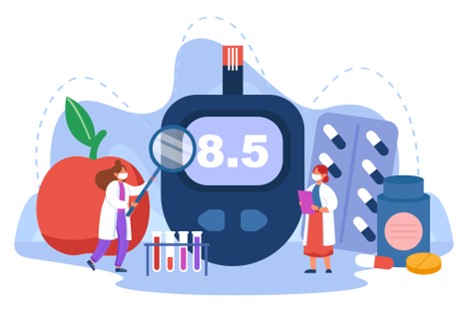Hypoglycemia happens when your blood sugar falls too low. Glucose is really important because our bodies need it for energy use. The brain especially needs a constant supply of glucose to keep functioning well. When glucose gets too low, people might feel confused or dizzy, which can lead to more serious problems.
It is not just people with diabetes who must be wary of low sugar. Athletes engaged in intense exercise, non-diabetics under certain stresses, and even newborns can face hypoglycemia. Understanding this condition well is important for everyone across all ages.
This blog helps you recognize symptoms of low blood sugar, like feeling shaky or sweating. Knowing these signs, you can prevent more serious results.
Managing hypoglycemia properly is key to staying safe and healthy. This involves checking blood sugar regularly and being prepared with quick fixes like candy when needed. Eating balanced meals also helps keep glucose steady throughout the day.
We aim to debunk myths so you know what’s true about hypoglycemia treatment. Some think only sugary drinks can help, but that’s not all true. Be informed with correct facts, as knowledge powers the best actions.
By reading this, you will learn essential tips for managing your health better and protecting yourself from unexpected lows.
What Exactly Is Hypoglycemia?
Hypoglycemia means your blood sugar is lower than what’s normal. It’s most often when it’s less than 70 mg/dL. Glucose is the body’s fuel, giving energy to work properly every day. Your brain is especially needy for glucose to stay sharp and focused all the time.
Most people think hypoglycemia happens only with diabetes, but that’s not always true. Even those without diabetes can face low blood sugar after eating big meals. Also, drinking a lot of alcohol or skipping several meals can lead to this condition.
Different people feel symptoms at different sugar levels, but below 70 mg/dL is serious. It’s essential to keep your blood sugar steady to feel well and avoid issues. Being mindful helps you control it through better food choices and daily habits.
Unraveling the Causes of Hypoglycemia
Managing hypoglycemia is crucial for those with diabetes. Insulin or meds like sulfonylureas can drop blood sugar. Skipping meals or over-exercising without adjustments adds risk. It’s all about balancing diet, meds, and activity.
People without diabetes can get hypoglycemia from various reasons too. Reactive hypoglycemia pops up after eating due to extra insulin. Also, alcohol affects the liver’s glucose supply. Some drugs, like quinine or aspirin, can lower blood sugar.
Imagine a student who skips breakfast and eats a sweet snack later. This could cause a reactive hypoglycemic event. Alternatively, someone with diabetes might take insulin but not adjust after intense exercise, causing low glucose levels.
Spotting the Symptoms Early On
Identifying early signs of hypoglycemia is really important in managing it well. If you feel confused, can’t focus, or find yourself unusually irritable, be on the lookout. Other symptoms include a fast heartbeat, shaking, and sudden hunger pangs. Recognizing these hints helps in handling the situation quickly.
Experiencing low blood sugar at night brings its own challenges. You might have strange dreams or wake up drenched in sweat or with a headache. A light snack before bedtime could help keep your levels steady during the night and keep you safe.
The way people respond to low blood sugar varies from person to person. Your body might release adrenaline causing anxiety, or palpitations. Some might not feel these signs easily, making it tough to catch low sugar early. Knowing your own symptoms can really help in managing hypoglycemia better.
Diagnosing Hypoglycemia: When to Seek Help
Diagnosing hypoglycemia involves seeing how symptoms link with blood tests. Using home glucose meters gives you fast results to act quickly. It’s key to monitor often for those likely to have low levels.
Doing self-checks keeps you empowered, helping to catch symptoms early. People with diabetes benefit a lot from regular tracking. It keeps them aware and alert about their body’s changes.
If you still feel symptoms of low blood sugar, despite trying fixes, you might need urgent care. Long episodes can lead to bigger issues. Reaching out to your healthcare provider helps review medicines or habits causing frequent dips.
Practical Steps for Managing Hypoglycemia
When hypoglycemia strikes, it’s important to act quickly to prevent it from getting worse. Start by reaching for fast-acting carbohydrates like juice or candy. These are easily absorbed by the body and will help raise your blood sugar.
A useful technique is called the 15-15 Rule, which guides you through home treatment. It involves taking 15 grams of carbs, waiting 15 minutes, and checking your sugar levels again. If they haven’t stabilized, repeat the cycle until they do. This approach helps you manage low blood sugar effectively.
After following the ’15-15 Rule’, it’s crucial to eat a balanced snack. Pairing complex carbohydrates with protein can keep your blood sugar stable longer. Snacks like a small sandwich or fruit with nuts work well to maintain levels and prevent rebound effects.
Proactive Prevention Strategies
Planning your meals well can aid in managing blood sugar levels. For those with diabetes, aligning your diet with medication schedules helps maintain stability. This approach forms a strong line of defense in blood sugar management. Regularity is crucial for avoiding sudden drops.
People without diabetes can also experience changes in blood sugar levels. Eating balanced meals consistently throughout the day is key. Including foods high in fiber and healthy fats can help stabilize these levels efficiently.
Recognizing what affects your blood sugar is important. Being aware of triggers like alcohol or intense workouts can prevent emergencies. Checking for other health issues can also aid in keeping these effects under control.
Living Harmoniously with Hypoglycemia
Creating routines for managing hypoglycemia at home enhances day-to-day living. Using reminders for meals and having quick snacks helps stay on track daily. Tracking patterns using apps or journals makes it easier to notice changes in blood sugar levels naturally.
It’s crucial to always be prepared for reactive hypoglycemia episodes on the move. Carry something sugary like juice or candy for emergencies everywhere you go. This habit is as important as carrying an EpiPen if you have severe allergies.
It’s vital to inform friends and family about the symptoms of reactive glycemia. Educating them means they can support you during a low sugar episode. Managing stress well through deep breathing or talking to someone helps keep levels steady.
Dissecting Myths and Misunderstandings
People believe only diabetics have hypoglycemia; that’s not true. Non-diabetics can also suffer from low sugar for different reasons. Some medications can cause blood sugar to drop suddenly without warning. Understanding this broadens awareness about medicine-induced hypoglycemia, a lesser-known risk.
Many think simple sugars are the best solution for low sugar, which is wrong. Simple carbs can help quickly, but they don’t fix things long-term. It’s better to follow a food plan with complex carbs and proteins for stability. A balanced diet helps keep sugar levels steady in the long run.
Continuous glucose monitors are changing how we care for hypoglycemia now. They give real-time data, so people learn about their own sugar patterns better. With this tech, constant finger testing is not needed as much anymore. This progress helps both new and old understand low sugar levels better every day and in emergencies.
The Role of Regular Medical Evaluations
Ignoring hypoglycaemia treatment can lead to long-term health problems later. Untreated cases might result in neurological issues and lesser brain functions, potentially becoming serious over time.
Visiting the doctor regularly helps manage hypoglycemia more effectively. Working together, healthcare providers can tailor plans to suit changing needs throughout life, boosting treatment outcomes.
Being involved in your health journey brings empowerment. Regular doctor visits enable significant steps toward proactive care, fostering a synchronized effort between patient and healthcare provider.
Take Charge of Your Blood Sugar with Global Diagnostics
Early detection and regular monitoring are key to managing hypoglycemia effectively. At Global Diagnostics, we provide:
- Accurate blood sugar testing
- Expert guidance on interpreting results
- Comprehensive health checkups tailored to your needs
Don’t wait for symptoms to worsen.
Call us today to book your blood sugar test.
Global Diagnostics — Empowering you with knowledge and care for a healthier life.





